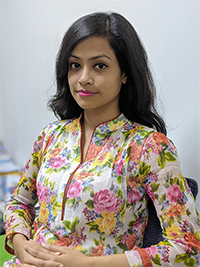MSc student uncovers revolutionary approach to solar microgrids
Sohara Mehroze Shachi is a 2021 Masters of Science (MSc) student at the Environmental Change Institute, University of Oxford and Head of Solutions Mapping at UNDP's Accelerator Lab. She is also a freelance journalist, and in early 2021 Sohara was given the opportunity to travel to Bangladesh for a short documentary on ME SOLshare Ltd, a peer to peer solar energy company that is revolutionising energy systems in parts of rural India. In the below interview, Sohara explains the unique challenges of filming on a remote island in Bangladesh during a pandemic, and why she was inspired to undertake an MSc in Environmental Change and Management.
Why did you apply to the Environmental Change and Management programme?
I have worked in the field of sustainable development for several years. Over the course of my work on building climate resilience, I realised that the biggest challenge to combating climate change in my country is the dearth of professionals with an interdisciplinary understanding of environmental management and climate science. I aimed to help fill this gap. I applied to the Oxford MSc in Environmental Change and Management as I knew it would help me address challenges related to natural resource management, analyse environmental policies and make informed recommendations to government ministries for attaining sustainable development.
Why is environmental change and management important to you, personally?
Growing up in one of the most climate vulnerable countries of the world, I have first-hand experience of the devastating impacts of natural disasters - the frequency and intensity of which are increasing due to climate change - wreaking havoc on the lives of millions of people on the forefront of these calamities. This has shaped my perception of what directionless economic growth powered by fossil fuels and unmitigated carbon emissions can result in, and the urgent need of better managing the implications of our actions on people and the planet.
What was the experience like?
This was a very unusual year in many ways, with most of the in person activities being replaced by virtual alternatives due to Covid-19. While it was very unfortunate that we could not have in-person classes and most of our field trips had to be cancelled, it was still a great experience finding new ways to engage with the fascinating academic content virtually and forge meaningful relationships with professors and coursemates online. The small size of the ECM cohort meant that we all still became a very tight knit group and I am very grateful for the amazing friends I have made here.
What was it like to film the documentary? What is your most vivid memory from that time?
When I signed up for this assignment, I knew that making a documentary on ME SOLshare Ltd. - 'the Uber of the off-grid world' - in one of the most remote islands of Bangladesh, amidst the raging pandemic, was going to be challenging. But what I did not expect was how physically taxing it would be.
The first day involved 17 hours of filming on the bustling streets of Dhaka that lasted from early morning till 1am, under pouring rain - scenes that subsequently did not make it to the documentary.
The next day we embarked on the arduous journey to the remote island of Pirgacha, in the northern Bogra district in a rickety boat over turbulent waters during an intense heat wave. One of our crew members had a heat stroke while filming this journey, and I struggled to see anything as sunglasses were not allowed during the shoot.
While we had planned to return after the shoot overnight from the island (with hotel bookings in mainland Bogra), it became evident that we were not going to make it back as the journey was much longer than we had anticipated. We realized on reaching the island that we would have to spend the night there, but there were no hotels, so our only option was relying on the kindness of the villagers who graciously let us stay in their homes.
We worked around 18 hours under the scorching sun on both days, having to skip meals, showers and often toilet breaks to finish shooting all the scenes on time.
Despite the ordeal, what kept me going was the incredible tale of electrification I was helping unfold, seeing solar panels and Solshare's "Solboxes" in various nooks and corners of this island that had no access to electricity before, with renewable energy lighting up not just people's homes but also their faces with laughter and the hope of a brighter future.
What else are you working on? What are your plans for the future?
Besides my full-time job with the United Nations Development Programme and my environmental journalism work, I am also part of a voluntary youth organization called Global Shapers Community through which we implement initiatives to address various socio-economic and environmental challenges. I am also part of a music group and love singing. My plans for the future are to aid governments in adopting more ambitious mitigation and adaptation measures, help businesses reduce their carbon emissions to attain net zero and a circular economy, and to continue raising awareness on environmental issues while spreading the hope of a greener future through journalism.
Watch the Al Jazeera documentary.
MSc student uncovers revolutionary approach to solar microgrids

Sohara Mehroze Shachi is a 2021 Masters of Science (MSc) student at the Environmental Change Institute, University of Oxford and Head of Solutions Mapping at UNDP's Accelerator Lab. She is also a freelance journalist, and in early 2021 Sohara was given the opportunity to travel to Bangladesh for a short documentary on ME SOLshare Ltd, a peer to peer solar energy company that is revolutionising energy systems in parts of rural India.




